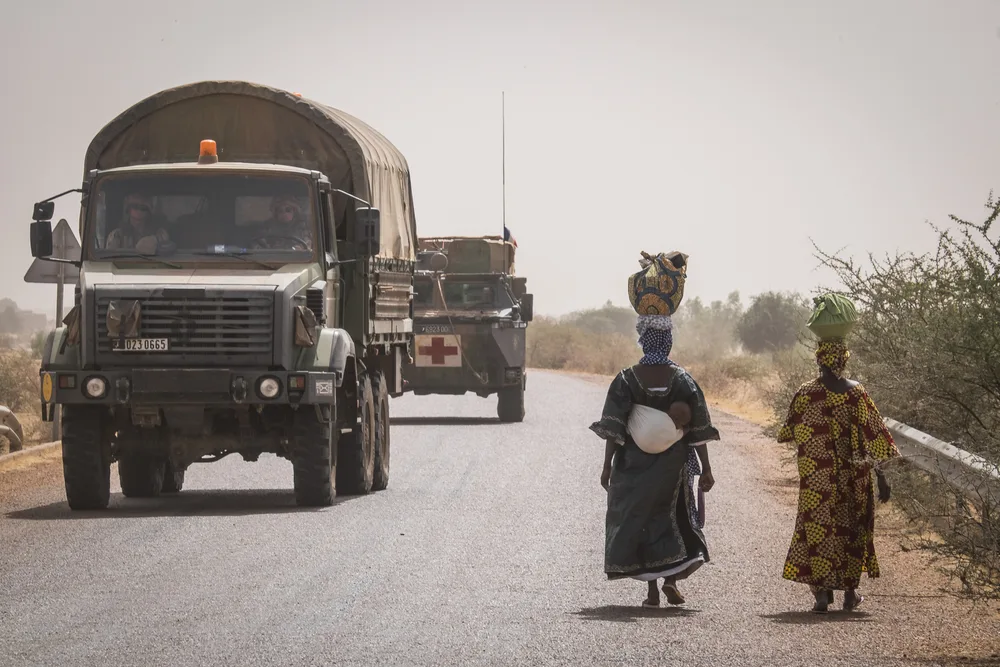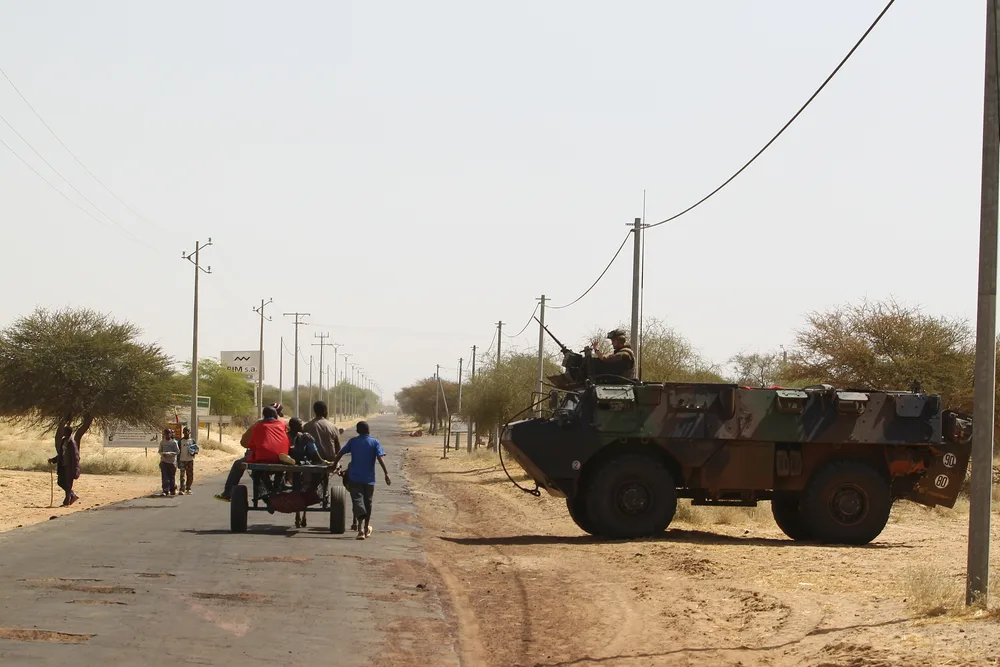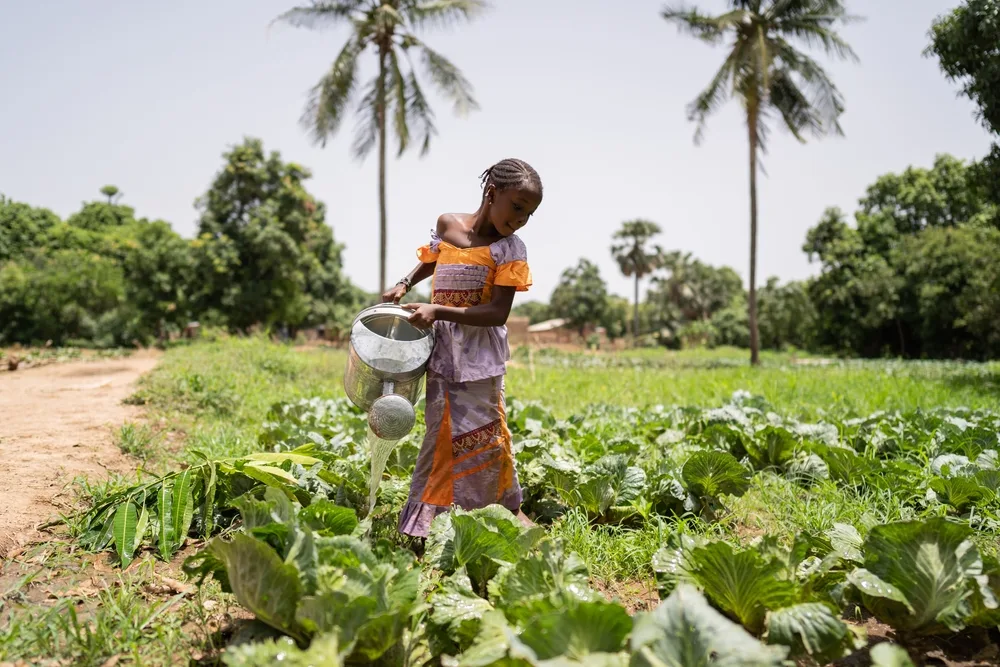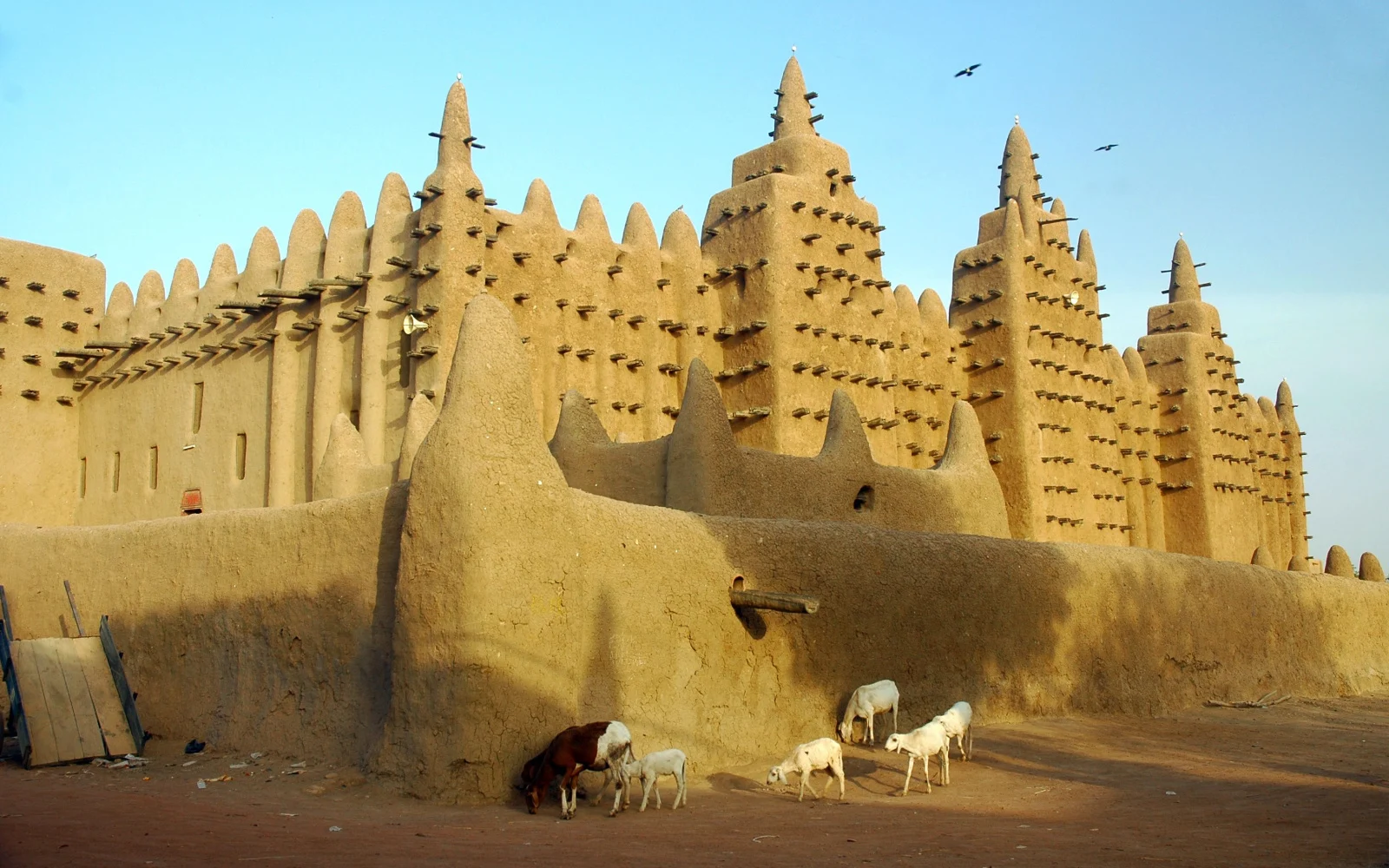Amazing Mali, the cradle of a medieval empire, captures the imagination. The country is home to historic centers of knowledge, architecture, and culture, such as the Great Mosque of Djenné and the famous learned city of Timbuktu.
Mali is also a great place to visit if you want to explore the surprisingly diverse landscapes of the desert. Get into nature at sites such as the spectacular Bandiagara Cliffs, a UNESCO World Heritage site, or La Dune Rose.
But while this storied country is rich in history, culture, and amazing natural beauty, is Mali safe to visit? Here’s our take.
Is Mali Safe to Visit in 2025?

Trevor Kittelty/Shutterstock
No. Unfortunately, Mali is not a safe place to visit right now. Most countries advise their citizens against visiting Mali due to the high risk of terrorism and civil unrest.
The unstable situation in the country has also created the perfect conditions for an uptick in violent crime, which often targets foreigners. A quick look at the travel advisories issued by different countries can give you an idea of why traveling to Mali is not the best idea right now.
The United States put the country under a Level 4 travel advisory, telling its citizens and employees not to travel to Mali under any conditions. It warns citizens that the risk of violent crime, such as kidnapping and banditry, is high, as is the risk of terrorist attacks.
Even U.S. State Department officials only stay in the capital Bamako and don’t venture elsewhere out of concern for their own safety. The United States is not the only country in the world telling people not to travel to Mali.
Canada also tells its citizens to avoid all travel to Mali. It cites the risk of political instability, terrorist groups that exercise de facto control in certain regions, and violent crime, such as kidnappings, that target foreigners in particular.
Mali once used to be one of the most popular tourist destinations in West Africa, so what happened?
The answer lies in the past decade of civil unrest, insurgency, and civil war. In 2012, a Tuareg group called MNLA rebelled in the north (there has been a Tuareg separatist movement for decades in Mali).
The ensuing military coup ensured that terrorist groups, mostly Islamist groups, quickly gained control of the north.
Although the separatists and the Islamists quickly broke their coalition, the instability has wrecked the country and even spread to neighboring ones. The situation hasn’t shown any signs of stabilizing, especially since there were military coups in 2020 and 2021.
People are upset with the government’s inability to pacify the situation, creating a no-war, no-peace situation, as well as the fact that the government invited French troops to quell the uprising, resurrecting past memories of colonialism.
Mali’s recent history means that the country has effectively been in a power vacuum for a decade and that the situation is growing desperate for locals.
This creates the perfect storm that allows separatists, criminals, and terrorist groups to operate in the country. Plus, the government doesn’t have enough control to protect its own citizens, let alone foreigners that travel there.
To recap, visitors to Mali should be realistic about their chances of experiencing:
- Civil unrest, including coups
- Terrorism
- Kidnappings
- Banditry
For now, it’s best to admire the sites of Mali from afar and book your trip once the situation stabilizes.
Crime in Mali

Fred Marie/Shutterstock
Due to the state’s tenuous control over its territory for the past decade, crime statistics for Mali are not exactly comprehensive or accurate. The government has bigger worries than trying to tally exactly how many murders, kidnappings, and armed robberies happen every year.
The World Bank, which gathers data on intentional homicides per country, has no data for Mali due to the difficulty of collecting information.
The UN was able to collect data on homicides and estimates that Mali experiences about 10.8 homicides per 100,000 people per year, which is higher than the world average. According to the Global Organized Crime Index, Mali has a high level of criminality.
Insurgent groups and criminal gangs operate human trafficking rings, arms trafficking, and the drugs trade. High levels of corruption mean that these groups are very powerful.
The biggest concern for visitors and residents of Mali is terrorism. Sadly, the problem has been increasing in recent years as instability in Mali spread to neighboring countries, making the Sahel a hotspot for terrorism.
According to the Global Terrorism Index, Mali’s value is 8.152 as of 2021 and has steadily increased over the past decade. In 2019, 4,000 people died because of terrorism in Mali and neighboring countries Burkina Faso and Niger.
The numbers combine to paint a concerning picture of Mali. The security situation, which has been bad since 2012, shows no signs of improving but is, instead, deteriorating.
The impact on safety is so bad that people don’t even have accurate crime statistics, just the knowledge that bad things could happen at any moment.
Terrorism
The primary concern for most people thinking of visiting Mali, as well as Malians themselves, is terrorism. This concern is well-founded. Since the instability started in 2012, terrorist groups have proliferated in the country, seizing control of territory, especially in the north.
There are many terrorist groups operating in Mali. Some of the most powerful groups include ISIS in the Greater Sahara, al-Qaida in the Islamic Maghreb, and Ansar al-Dine.
The last two are part of a larger coalition of terrorist groups called the JNIM. These groups sometimes work together and sometimes fight amongst each other, affecting the lives of people in Mali no matter what they do.
Don’t be fooled by reports that terrorist groups control the north — they can strike anywhere. In 2022, terrorist groups such as JNIM carried out attacks in Bamako, the capital, and the Kati military camp in the south, both locations that were considered safe until then.
Attacks proliferate at high levels — the UK government website lists eight attacks in July 2022 alone. Repeated coups probably don’t inspire confidence in the government’s ability to regain control.
Terrorist attacks often target Westerners. Terrorists will attack hotels where they know foreigners stay.
The US government even pulled out all non-essential embassy staff and all families from Mali in response to the deteriorating security situation. If trained diplomats won’t brave Mali, you probably shouldn’t as a tourist.
There is really no way to avoid a terrorist attack. Areas where Westerners frequent, such as hotels, diplomatic embassies, and restaurants, have beefed-up security — but they are also bigger targets.
Terrorist attacks are more common during festivals, which led to the cancellation of Mali’s world-famous Festival au Desert, but they can happen anywhere. The only way to completely avoid not being a victim of terrorism in Mali is to not go to Mali.
Kidnapping
Due to the instability in Mali, the rates of violent crime are higher and higher. One of the most common crimes that occurs in Mali is kidnapping.
Terrorist groups and organized crime syndicates target Westerners for kidnapping because they know they can exchange hostages for a lucrative ransom or for political leverage. There have been cases of hostages dying in Mali.
The Canadian government explains that Westerners are at risk of kidnapping in its travel warning for its citizens. Although the risk is higher in border areas and on rural roads, it can happen anywhere, even in Bamako.
Most dignitaries who visit Mali for work take extra precautions to avoid kidnapping, including traveling with unpredictable routes, not traveling alone, and traveling during the day.
There is an elevated risk of kidnapping at night. At night, roadblocks are common across the roads wherever you go. The roadblocks are set up by government forces to control who is traveling, but also by terrorist groups for their own purposes.
Kidnapping is the most prevalent violent crime in Mali, but it’s worth mentioning a few others that you should keep in mind. Banditry is also common on the roads, especially heading towards the north.
So, when you travel around Mali, there’s always a risk that you will get stopped and robbed at gunpoint. The few tour operators that still take people to Timbuktu in the north will only fly or sail there, not drive.
Carjacking is another violent crime that occurs frequently and especially targets foreigners.
When assessing your risks of becoming the victim of a violent crime in Mali, keep in mind that most governments have no consular or diplomatic resources based in Mali anymore, as the situation is so fraught even diplomats withdrew.
If you get kidnapped, there might not be anyone available to help you. This alone should deter you from visiting the country.
Avoiding Bad Areas

6 February 2013. Timbuktu, Mali. The Tuareg Rebellion of 2012 was an early stage of the Northern Mali conflict; from January to April 2012/Ymphotos/Shutterstock
Certain parts of Mali are much riskier than others. The UK government advises travelers to avoid all travel to the north and east of the country as well as the border with Cote d’Ivoire.
It has a lower alert level for Bamako and the rest of the south but still advises people to only go there on essential travel. Other governments are not so optimistic.
The Australian government amended its travel advice to tell citizens to avoid all travel to Mali. It also previously recommended some form of travel to the south, but changed this alert after terrorist attacks increased in late 2022.
Bamako, the capital, used to be one of the safer parts of Mali, but this advisory level changed last year. The city has seen several terrorist attacks, protests turned violent, and even a coup.
Protests often happen around the Independence Monument and the Bourguiba Monument but can occur anywhere in town. For now, it’s probably best to stay away until the situation calms down.
Things to Consider
Here are some other things to keep in mind about visiting Mali:
- Petty crime and pickpocketing in Mali are also frequent.
- Be careful traveling to, from, and at Bamako International Airport. Scammers and thieves operate at the airport, while kidnappers and bandits often target the road to the airport as they know Westerners go there.
- Road conditions are poor, and roads are often impassable during the rainy season. Avoid driving yourself if you can.
- Some governments ask you to register with them if you are their citizen and headed to Mali so they can retrieve you in case of danger. Check the requirements for your country.
Frequently Asked Questions

Riccardo Mayer/Shutterstock
Still curious about Mali? Here are some more things you might want to know:
Is it safe to visit Timbuktu?
Sadly, it is not safe to visit Timbuktu at the moment. Timbuktu is in the north of Mali, which is the least stable region, so you should avoid traveling there.
Is Mali safe for ex-pats?
No, Mali is not safe for visitors, let alone long-term residents or ex-pats. Living in Mali will attract unwanted attention, and Westerners are often targeted for kidnapping.
What are the safest cities in Mali?
There are a few towns in Mali that are less risky to visit, mostly in the south. These include Ségou, Siby, and Sikasso.
Why should you visit Mali?
Once the security situation calms down, you absolutely should visit Mali. The country has many rich mosques, universities, and libraries left over from the medieval Malian empire, including buildings the likes of which you won’t find anywhere else.
Is Mali rich or poor?
Mali is a poor country. It is classified as a least developed country, and the security situation which has displaced many people certainly isn’t helping matters.
So Is Mali Safe to Visit?
At the moment, you should probably postpone your trip to Mali. Mali is not safe to visit due to continued unrest for the past decade that saw terrorist groups gain power and even control parts of the territory.
While in the past travel to the south and central parts was safe, unrest has increased in these areas over the past year.
We think it’s best to avoid the country at the moment. But fortunately for you, there are many other nearby countries that offer the same beauty and history as Mali. Happy travels!



